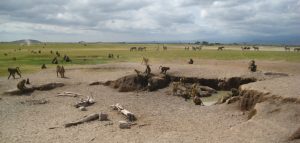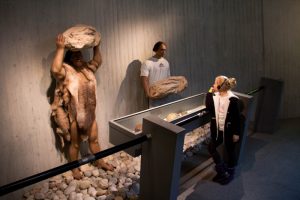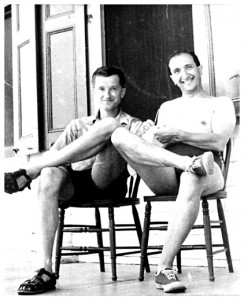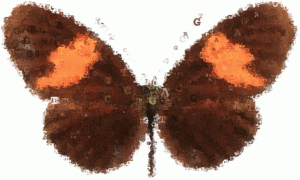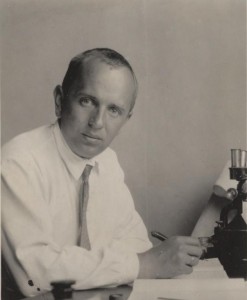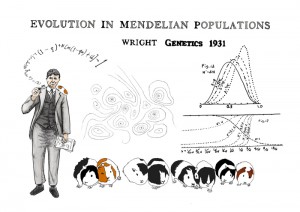Enter your address to receive notifications about new posts to your email.
Articles tagged Evolution
(108 results)
-
Genetic test helps ponies leave the past behind
For the past several decades, Shetland ponies’ collective past had caught up with them. A portion of the population of these miniature horses is affected by atavism, a phenomenon in which ancient characteristics are accidentally revived by mutations. Traits reincarnated in this way sometimes interact disastrously with the genetic background of the modern organism. For…
-
Selfish self-fertilization hampers adaptation
When finding a mate is difficult, self-fertilization offers a tempting solution by increasing the number of offspring an individual can produce. But although “selfing” provides a stopgap solution when mates are scarce, it is frequently an evolutionary dead end; when environmental conditions change, species with high selfing rates seem prone to extinction. In an article…
-
How bacteria dodge new antibiotic candidates
Antibiotics, a vital tool for fighting infections, were originally products of nature—the first antibiotic was serendipitously discovered in mold contaminating a bacterial culture. As antibiotic resistance becomes an increasingly serious threat, scientists are attempting to wring another type of pathogen-fighting drug from the wild: antimicrobial peptides. Antimicrobial peptides, or AMPs, are found in almost every…
-
Fecal alchemy: Turning poop into genomics gold
When it comes to genotyping technology, poop genetics is stuck in the 1990s. While most geneticists are now awash in genome-scale data from thousands of individuals, those who depend on fecal and other non-invasively collected samples still rely on old-school, boutique panels of a dozen or so genetic markers. But feces — along with fur,…
-
Inbred Neanderthals left humans a genetic burden
The Neanderthal genome included harmful mutations that made the hominids around 40% less reproductively fit than modern humans, according to estimates published in the latest issue of GENETICS. Non-African humans inherited some of this genetic burden when they interbred with Neanderthals, though much of it has been lost over time. The results suggest that these harmful…
-
Runaway amplification: 800 copies and counting
Massive amplification of genes is a desperate strategy taken by stressed populations adapting to an environment that has become inhospitable. Such amplifications can give an underperforming gene a much-needed boost in productivity simply by increasing its copy number. But counterintuitively, research reported in the May issue of G3 implies these amplifications may arise even in…
-
Luria & Delbrück: Jackpots and epiphanies
In the early 1940s, many biologists doubted bacteria had genes. After all, they seemed to play by their own genetic rules: they appeared to lack chromosomes, meiosis, mitosis, sex, and all the other trappings of Mendelian inheritance. They even seemed to show a kind of Lamarckian inheritance, in which an individual could pass on traits acquired…
-
Evolving butterflies and genome assemblies
The dizzying array of wing patterns in Heliconius butterflies has served as a model for evolution and adaptation in the wild for more than a century. The genus is most famous for the way different species within a geographic region tend to converge on similar wing markings—known as biological mimicry. In the latest issue of…
-
What doesn’t kill you makes your offspring stronger
When a C. elegans nematode starves early in its life cycle, its offspring are more resistant to starvation in the next generation; however, this life-saving inheritance comes at a fitness cost for the worm itself, reveals research published in GENETICS. Jobson et al. investigate the idea that lean experiences during early development cause organisms to…
-
Dobzhansky: Bug collecting and the Modern Synthesis
In 1917, amidst the turmoil of the Russian Revolution, a bug-obsessed teenager in Kiev discovered a new species of ladybird beetle in the debris washed up on the banks of the flooding Dnieper River. The following year, he described the species in his first scientific publication. That 18-year old ladybug spotter —Theodosius Dobzhansky— would go…
-
Sewall Wright: Evolving Mendel
In 1931, Sewall Wright—a quiet American geneticist specializing in livestock and guinea pigs—published a GENETICS paper that changed how we study evolution. Wright’s “Evolution in Mendelian populations” was one of the founding documents of population genetics and was among the first formal frameworks to reconcile Mendel’s laws of inheritance with Darwin’s vision of natural selection.…

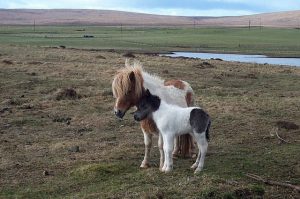
![Helonias bullata, a species threatened with extinction. Its low genetic diversity, a factor contributing to its decline, may have been caused by a high rate of self-fertilization. By Hedwig Storch (Own work) [CC BY-SA 3.0 (http://creativecommons.org/licenses/by-sa/3.0)], via Wikimedia Commons.](https://s36063.pcdn.co/wp-content/uploads/2016/07/1024_Helonias_bullata_Arktisch-alpiner_Garten_Chemnitz-0931-e1467579681557-300x197.jpg)
![Molecular model of penicillin, the first antibiotic discovered. Later, antimicrobial peptides were also found to have antibiotic properties. By Science Museum London / Science and Society Picture Library [CC BY-SA 2.0 (http://creativecommons.org/licenses/by-sa/2.0)], via Wikimedia Commons.](https://s36063.pcdn.co/wp-content/uploads/2016/06/Molecular_model_of_Penicillin_by_Dorothy_Hodgkin_9663803982-300x212.jpg)
